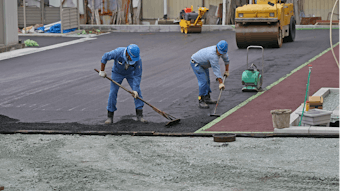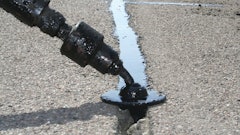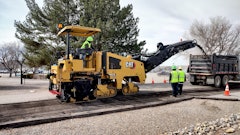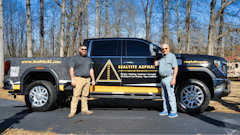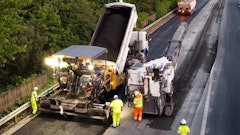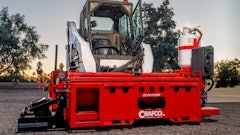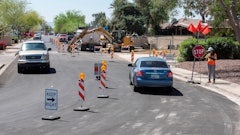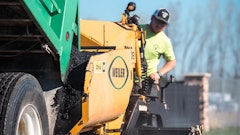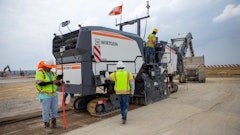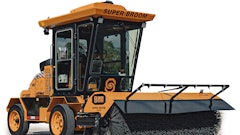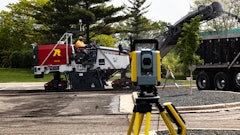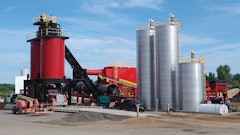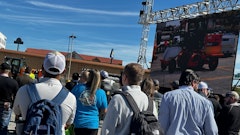
Most contractors have realized that the current economy has increased material costs while many customers' budgets have shrunk. This is no different if the majority of your work comes from cities, counties, or states. But it's not all bad news if you're in the pavement maintenance industry.
"We're going to see a lot more maintenance like chip seal and other types of sealing with the cost of asphalt going up," predicts Tracy Turner, owner of Southwest Surfacing in New Mexico. Southwest Surfacing is a chip sealing contractor that does most of its work for counties. To make sure his company stays ahead of the game - and the economy - Turner has turned to technology and new equipment.
In 2007, Quay County, NM, hired Southwest Surfacing to chip seal nine miles of road. The county, which is on the eastern side of the state and has limited access to asphalt materials, was very conscious about saving money, Turner says. And Southwest Surfacing had just the thing to help.
Turner employed his 2004 E.D. Etnyre chip spreader with computer controlled accuracy for the nine-mile stretch of road. Having computer controlled accuracy for the chip spreader provided benefits for both Quay County and Turner.
"With a manual controlled machine, when you take off it starts dumping the same amount whether you're going five miles an hour or 10 miles an hour," Turner says. "The computer controlled machine evenly distributes material from start to stop. It's always an evenly spread amount of material because it's calculating the speed of the machine. So every time you start and stop you're not wasting a bunch of material."
Less wasted material can save the customer money. "With the computer controlled chip spreader we get a savings of about 25% on our material," For Southwest Surfacing, the technology offers the benefit of increased productivity with the computer controlled accuracy.
"If the machine isn't wasting rock, it's not using it. And if it's not using it that means the machine can go that much further on that much gravel," Turner says. "It's fewer loads that have to be hauled to that machine and there's less clean up time," he adds. Turner estimates that with his old manual chip spreader he was laying down approximately 210 tons of rock per one mile of road. With his computerized controlled chip spreader, he estimates he now lays down about 154 tons of rock per one mile.
Plus, the computer controlled chip spreader doesn't alter Southwest Surfacing's chip sealing process, it just refines it. For the Quay County roads, Turner's crew first repaired any cracks and potholes in the road and then swept the road.
Turner then used his Bear Cat 4,300-gal. asphalt distributor - which also has computer controlled accuracy - to apply the HFE 90 (High Flow Emulsion) on the road. The computer control prevents extra liquid asphalt from being applied and wasted. The E.D. Etnyre chip spreader, fed by a dump truck, follows the Bear Cat and applies the 3/8-in. aggregate to the road. Two pneumatic, nine-wheel rollers followed the chip spreader to finish the job. After the chip seal had time to cure, Southwest Surfacing came back to sweep the road and remove any loose rock that did not stick to the emulsion. At that time, the loose rock was just swept to the side of the road.
Taking the next step
In 2008, Southwest Surfacing returned to Quay County, this time to chip seal a smaller, three and a half miles of road. What was different about this job? Turner used the material saved during the 2007 job to chip seal this stretch of road. And, Turner had a new piece of equipment in his chip sealing fleet: the Broce MK-1 Transfer Sweeper.
Turner used the same process and his Etnyre chip spreader for chip sealing the road. But at the end, instead of sweeping the extra rock to the side of the road, he now had the ability to come back with the MK-1 and recycle any aggregate that had not stuck to the liquid asphalt.
"Street sweepers are not designed to pick up the volume of rock that is left on the road," Turner says. "In some cases, with the MK-1 Transfer Sweeper, we pick up about 15% to 20% of what we laid down." In years prior, that 15% to 20% would have been swept off to the side and wasted. But the MK-1 is designed to sweep up all the loose rock, resulting in approximately 20 tons of recycled rock per mile, Turner says.
The MK-1's rotary broom sweeps up the rock onto a conveyor belt which then carries it into the back of a dump truck in front of the sweeper, Turner says. "If you sweep fairly soon after doing the chip seal, we find there's very little contamination in the rock. Leaves and debris gets onto the road; but, barring any inclement weather, if you do it within a day or two it's relatively clean and can be reused," Turner says.
The recycled aggregate can then be stockpiled and used for chip sealing other roadways. When using the recycled aggregate, Turner suggests wetting down the rock before reuse to ensure there is no dust on it. Dusty rocks may not stick to the asphalt when chip sealing.
The MK-1 is an 8-ft.-wide unit, so a 24-ft.-wide road can be done in just three passes, Turner says. "I would say you can safely sweep up two to three miles a day with this sweeper," Turner says.
The ability to recycle aggregate goes beyond saving money. Drivers benefit, too. Loose rock on roads can get kicked up and crack windshields. It is also a danger to speeding vehicles. Hitting loose rock at high speeds can cause a driver to lose control and result in an accident.
For Southwest Surfacing and Quay County, technology and recycling equipment was the solution that offered the most benefit to Turner's company's process, the customer's bottom line, and the safety of motorists traveling on the chip sealed roads.

